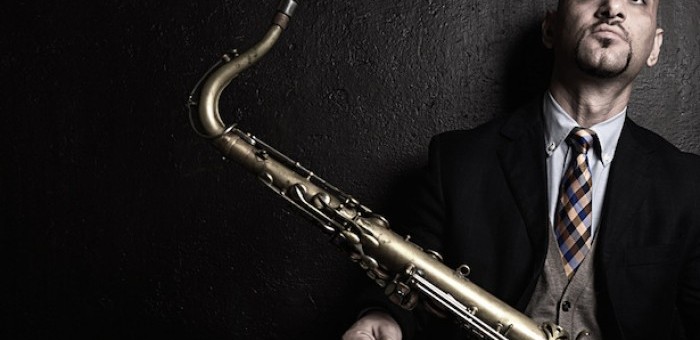Jan 13, 2026 2:09 PM
More Trump-Kennedy Center Cancellations
The fallout from the renaming of the John F. Kennedy Center for the Performing Arts to include President Donald…

Eli Degibri
(Photo: Courtesy of the artist)On a night when Donald Trump’s stunning presidential victory underscored the deep partisan differences in the American electorate, the masterful set by saxophonist Eli Degibri at Dizzy’s Club Coca-Cola in New York proved that great joy can come from bridging diverse ideologies.
Melding Middle Eastern music and Western classical traditions with Degibri’s formidable tenor sound, the band’s well-knit outing was both lilting and lively.
Throughout the one-hour performance at the intimate 140-seat venue that overlooks Columbus Circle and Central Park, the Israel-born Degibri demonstrated the extent of his musical growth from his past stints as a sideman with Herbie Hancock’s sextet and Al Foster’s band.
As a leader, he gets the most out of his sidemen by playing with fire while invoking a multifaceted musical sensibility that embraces diversity and contradiction. In its maiden gig, this newly assembled quartet—composed entirely of Israeli musicians—was not merely technically precise; it pulsated with life. The band’s jaunty energy was perhaps its most distinguishing feature.
Among the six tunes on the quartet’s set list, four came from Degibri’s new album, Cliff Hangin’ (BluJazz), which earned a five-star review in the August issue of DownBeat. Alternately melodic and muscular, the band exemplified the spirit that welcomes differences and finds a way to unify contrasting traits.
The multilayered personality was in evidence in the opener, “The Troll,” which saw Tom Oren’s lyrical piano pave the way for a Degibri tenor foray that was both fiery and cogent. On the new album’s title track, the quartet seemed to find the audience’s sweet spots easily, producing a cathartic listening experience that was greater than the sum of its parts.
Although tenor is Degibri’s main instrument, he also is a formidable soprano saxophonist with otherworldly breath control, as he demonstrated on “Even Bees Do It.” A vague nod to Cole Porter’s “Let’s Fall In Love,” the tune itself was the set’s lone weak entry, its jumble of changes at times devolving into incoherence.
“The Unknown Neighbor,” another song from the album, began with Oren and Tamir Shmerling on bowed bass in a melancholy duet that had elements of a Middle Eastern folk song. Initially, Degibri dwelled in a meditative space, playing with a stately dreaminess that reflected the influences of the classical and Israeli music he absorbed while growing up.
As the tune progressed, his improvisations drew heavily on hard-bop tradition and reflected his admiration of saxophonist Sonny Rollins. After his foray reached a thundering climax, the piece returned to its plaintive beginning, a gem showcased against the backdrop of the glittering Manhattan skyline.
The set’s tour de force was “Big Fish,” which allowed Degibri to display his tenor virtuosity with vigorous solos from Oren, Shmerling and drummer Evatar Slivnik.
Degibri again showcased his rough and ready tenor sound on the rousing concluding number, “The Cave.” Blending folk song and ballad forms at the outset but eventually yielding to intense tenor melisma, the tune began with a plaintive, bittersweet theme and minimalist drum accompaniment. Taking on an elegant majestic grandeur, the piece climbed in volume and power. As Degibri ratcheted up his own intensity, he scraped up the earthiest sounds he could find.
But on an election evening that highlighted the country’s divisions, these screeches offered balm for campaign-tortured souls.

Belá Fleck during an interview with Fredrika Whitfield on CNN.
Jan 13, 2026 2:09 PM
The fallout from the renaming of the John F. Kennedy Center for the Performing Arts to include President Donald…

Peplowski first came to prominence in legacy swing bands, including the final iteration of the Benny Goodman Orchestra, before beginning a solo career in the late 1980s.
Feb 3, 2026 12:10 AM
Ken Peplowski, a clarinetist and tenor saxophonist who straddled the worlds of traditional and modern jazz, died Feb. 2…

The success of Oregon’s first album, 1971’s Music Of Another Present Era, allowed Towner to establish a solo career.
Jan 19, 2026 5:02 PM
Ralph Towner, a guitarist and composer who blended multiple genres, including jazz — and throughout them all remained…

Rico’s Anti-Microbial Instrument Swab
Jan 19, 2026 2:48 PM
With this year’s NAMM Show right around the corner, we can look forward to plenty of new and innovative instruments…

Richie Beirach was particularly renowned for his approach to chromatic harmony, which he used to improvise reharmonizations of originals and standards.
Jan 27, 2026 11:19 AM
Richie Beirach, a pianist and composer who channeled a knowledge of modern classical music into his jazz practice,…